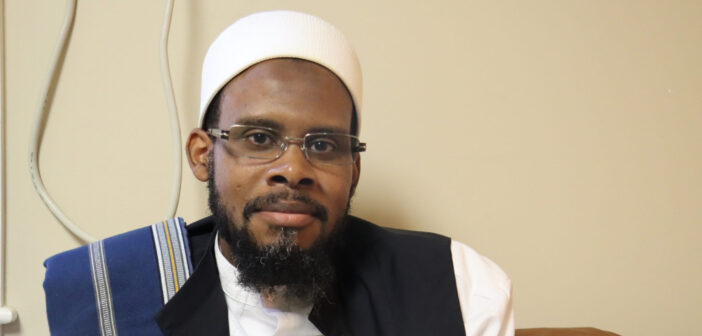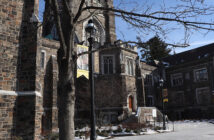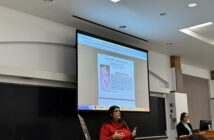Ahmed Noureldaem, ‘24, struggled to find an active Muslim organization on campus when he arrived in 2020.
For the next three years, he worked tirelessly with fellow students to form an active Muslim Student Association that led weekly Jumu’ah prayers, fundraised for Ramadan dinners and provided emotional support to over 300 students.
This fall, Lehigh’s Dialogue Center welcomed Tariq Ameer, the first full-time Director of Muslim Student Life.
Ameer has been a chaplain since 2018. Inspired partly by a year-long trip to study in Yemen, he left his nearly 10-year corporate career to pursue this role at the Northern State Prison as well as the Robert Wood Johnson Hospital in New Jersey.
He decided to explore chaplaincy at an educational institution after the “toxicity” of the prison environment started to take its toll on him.
Although Ameer said he doesn’t typically believe in coincidences, chance brought him to Lehigh. He discovered the open position through connections he formed in Yemen and other religious spaces throughout his career.
Nouraldaem said it’s been nice having Ameer advocate for Muslim students on campus because it was previously just students advocating for themselves.
“At the end of the day, we’re also students with just as many classes as other people,” Nouraldaem said. “That was very difficult on us.”
Lloyd Steffen, the University Chaplain and a professor of religious studies, said he co-chaired the search for the position with Donald Outing, vice president for equity and community, in April 2024.
Steffen said the strong connections formed in the Muslim community by former part-time director Walead Mossad motivated the hiring of a full-time director, coupled with the fact that Islam is the world’s fastest-growing religion.
He said Lehigh’s Muslim community has grown as the university’s international outreach has grown.
Given misunderstandings and stereotypes about Islam in recent years, Steffen said it’s important for someone within the faith to speak to those outside the tradition to share the messages of peace and understanding central to the Muslim religion.
“(Ameer’s) appointment is recognition that we need to serve the spiritual needs of Muslims on our campus,” Steffen said.
Ameer said he will serve as the liaison between Muslim students and administration. His goal is to secure a weekly prayer space, improve halal dining options for students and increase the Muslim Student Association’s alumni network.
By increasing this network, Noureldaem said the organization could receive donations from alumni to help offset the $1,000 per night cost of Ramadan dinners the association typically fundraises for.
Former Muslim Student Association president Huda Hagos, ‘24, ‘25G, said having a faculty member represent students is essential to productivity, considering how busy students are. She said while she was president, it was often difficult to bring issues to the attention of the university without this support.
Hagos said Ameer made it very clear from the start that he is at Lehigh to amplify students’ voices because he is so deeply invested in developing the Muslim community.
Ameer will offer private discussions and lead Friday prayer services to further the understanding of religion on campus.
Long-term, Ameer said he hopes the Muslim community on campus is vibrant and well-supported. He has aspirations to bring in well-known Muslim intellectuals for talks, collaborate with study abroad programs to organize an annual Umrah trip and have a Muslim student house on the hill.
Noureldaem said he believes the conflict in Gaza will bring an extra layer of challenge to Ameer’s position.
Ameer said one of his challenges in helping students with the conflict is the aspect of the unknown.
“We don’t know how it may end, and because of that, we don’t know what the reactions will be,” Ameer said. “So, (we are) trying to make sure that we are always in a place where we don’t stifle someone’s personally held beliefs or something that they feel very passionate about, but at the same time making sure that the university stays a safe and comfortable environment for everyone.”
Ameer hopes to show students that people can have differing theological viewpoints and still have important conversations with better emotional intelligence.
Hagos said Ameer’s position has been needed on campus, and she applauds the university for its commitment to diversity, equity and inclusion initiatives.
“By amplifying different voices and recognizing the diversity of our campus, you could only make it stronger,” Hagos said. “You recognize the power in diversity, in diverse ideas and opinions, but also the power in recognizing where we are at fault and how we can improve.”






Comment policy
Comments posted to The Brown and White website are reviewed by a moderator before being approved. Incendiary speech or harassing language, including comments targeted at individuals, may be deemed unacceptable and not published. Spam and other soliciting will also be declined.
The Brown and White also reserves the right to not publish entirely anonymous comments.